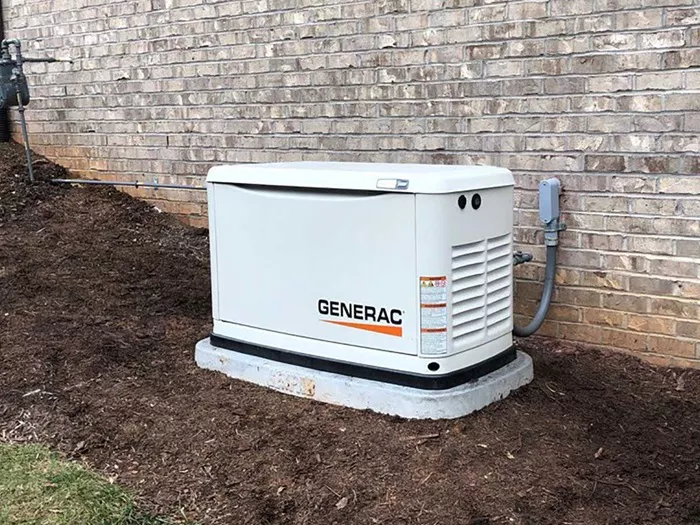A whole house gas generator can provide peace of mind by ensuring your home remains powered during a blackout or other power outages. These generators are capable of powering an entire home, including appliances, lights, and other electrical systems. However, before you make an investment, it’s important to understand the cost factors involved. In this article, we’ll break down the costs, factors affecting pricing, additional expenses, and the benefits of whole house gas generators.
Cost Range of Whole House Gas Generators
The overall cost of a whole house gas generator typically includes both the purchase price and installation fees. Here’s a breakdown:
Average Cost
Whole house gas generators generally cost between $6,000 and $11,000 for both purchase and installation.
Unit Cost
The generator itself usually ranges from $3,000 to $6,000 depending on size, brand, and features.
Installation Cost
Labor for installation is a significant portion of the overall cost. You can expect to pay between $3,000 and $5,000 for professional installation.
Factors Affecting the Cost of a Whole House Gas Generator
Several factors can influence the final price of a whole house gas generator. Here are the main considerations:
Size and Capacity
The size of the generator is one of the most important factors in determining the cost. Larger generators with higher kilowatt (kW) ratings are more expensive. The size needed for your home depends on the electrical load you want to power. Smaller homes may need a 10 kW generator, while larger homes may require 20 kW or more. The higher the capacity, the higher the price.
Brand
The brand of the generator can significantly impact the cost. Well-known brands, such as Generac, Kohler, and Cummins, often command a premium price due to their reputation for reliability, performance, and warranty. Lesser-known brands might offer a lower cost but may not provide the same level of quality or customer support.
Fuel Type
While this article focuses on gas generators, it’s important to note that gas generators can be more affordable than their diesel or propane counterparts. Diesel and propane generators tend to cost more initially, but gas generators offer a more budget-friendly option without sacrificing much in performance.
Location
Installation costs can vary greatly depending on where you live. In more urban areas or locations where installation involves complex processes (e.g., digging trenches or electrical work), labor costs will be higher. Furthermore, if your installation site is not easily accessible, this can increase the cost of both labor and equipment transportation.
Additional Expenses to Consider
In addition to the cost of the generator and installation, there are a few other expenses you may need to factor in:
Transfer Switch
A transfer switch is required to safely connect the generator to your home’s electrical system, ensuring that power is only sent to your home when it’s safe to do so. Transfer switches typically cost between $400 and $1,300, depending on the model and complexity of your home’s electrical setup.
Permits and Inspections
Some regions require permits and inspections for the installation of whole house generators. The cost of these permits varies by locality, but they generally range between $100 and $500. Failure to obtain the proper permits can result in fines or voided warranties.
Maintenance
To keep your generator running efficiently, regular maintenance is necessary. This may include oil changes, battery checks, and general servicing. Maintenance costs can vary but typically range from $150 to $300 per year, depending on the brand and size of the generator.
Benefits of Whole House Gas Generators
Investing in a whole house gas generator can provide numerous benefits beyond just the ability to ride out power outages:
Automatic Operation
Whole house generators are designed to automatically turn on when a power outage occurs, providing seamless backup power. This means you won’t need to manually start the generator or worry about running out of fuel, making it an incredibly convenient option.
Fuel Efficiency
Gas generators are often more fuel-efficient than diesel or propane-powered models. Gasoline is widely available, and modern gas generators are designed to optimize fuel consumption, ensuring you get the most power for your fuel.
Longevity
When properly maintained, a whole house generator can last anywhere from 15 to 30 years. This makes it a long-term investment that can pay off over time, especially if you experience frequent power outages or live in an area with unreliable electrical infrastructure.
Customer Reviews and Experiences
Many homeowners who invest in whole house gas generators report high levels of satisfaction with the convenience and reliability they provide. Common feedback includes:
Dependability
Customers frequently mention how reassuring it is to have a generator that automatically kicks in during an outage. This is especially beneficial for families who rely on electricity for medical equipment or other essential appliances.
Quiet Operation
Many newer models are designed to run quietly, minimizing noise disruptions during operation, which is particularly important for residential areas.
However, some users caution that the initial cost can be high, and the installation process can be intrusive, requiring significant adjustments to the home’s electrical system.
Expert Opinions
Experts recommend investing in a quality brand like Generac, Kohler, or Cummins, particularly if you live in an area prone to frequent outages. These brands are known for their reliability, ease of maintenance, and long warranty periods. Experts also stress the importance of choosing the right size generator for your home. Undersizing can lead to an overworked generator that may break down prematurely, while oversizing can result in unnecessary expenses.
Conclusion
Whole house gas generators are an excellent way to ensure your home stays powered during emergencies. With an average cost of $6,000 to $11,000 for both purchase and installation, they provide a reliable and fuel-efficient solution for homeowners. While the upfront costs may be significant, the long-term benefits, including automatic operation, fuel efficiency, and longevity, make them a valuable investment for many households. Be sure to factor in additional costs such as installation, transfer switches, and maintenance, and choose a generator that best fits your home’s needs.

